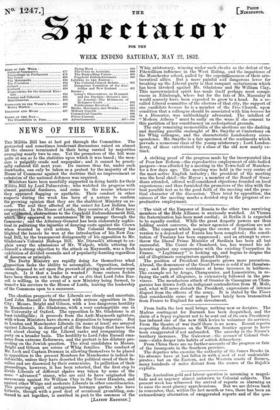The eleotion prospects of the Liberals are cloudy and uncertain.
Lord John Russell is threatened with serious opposition in the City; Messrs. Bright and Gibson, with a less dangerous hostility Hi Manchester ; Mr. Gladstone, with a very contemptible one in the University of Oxford. The opposition to Mr. Gladstone is at least intelligible ; it proceeds from the Anti-Maynooth agitators, with whom Ministers have shown a disposition to temporize. But Hi London and Manchester Liberals (in name at least) are arrayed against Liberals, in disregard of all the fine things that have been said about closing up the Liberal ranks and reorganizing the party on a broader basis. The hostility to Lord John Russell ema- nates from extreme Reformers, and the pretext is his dilatory pro- ceeding on the Jewish question. The rival candidates to Messrs. Bright and Gibson are scions of Whig families. The conduct of Mr. Loch and Captain Denman in allowing themselves to be placed in opposition to the present Members for Manchester is indeed in- defensible, unless they have deserted the political creed of their fa- milies and are disowned by their connexions. In palliation of their proceedings, however it has been retorted, that the first step to divide Liberals of different skades was taken by some of the more "advanced" stamp, who are said to have originated the movements against Sir William Clay in the Tower Hamlets, and rqainst other Whigs and moderate Liberals in other constituencies. This growing spirit of antagonism between parties who have hitherto, though with a good deal of occasional grumbling, con- turned to act together, is ascribed in part to the soreness of the Whig aristocracy, wincing under such chicks as the defeat of the Fitzwilliam influence in the West Riding, and the impatience of the Manchester school, galled by the supeonliousness of their aris- tocratical -allies. But a more- painful and dangerous lever for breaking up the Liberal party is that rampant sectarianism which has been invoked against Mr. Gladstone and Sir William Clay. This narrowminded spirit has made itself perhaps most conspi- cuous in Edinburgh, where but for the fate of Mr. Macaulay it would scarcely have been expected to grow to a head. In a so- called Liberal committee of the electors of that city, the support of one candidate because he is a member of the Free Church, upon condition that a colleague should be associated with him because he is a Dissenter, was unblushingly advocated. The intellect of "Modern Athens" must be sadly on the wane if she consent to this partition of her constituency on ecclesiastical ground!.
The only remaining memorabilia of the elections are the dashing and dazzling guerilla onslaught of Mr. Smythe at Canterbury on his Whig colleague, and the characteristic Londonderry corre- spondence. Mr. Smythe is a fair specimen of the sentiments which pervade a numerous class of the young aristocracy ; Lord London- derry, of those entertained by a class of the old now nearly ex- tinct.


























